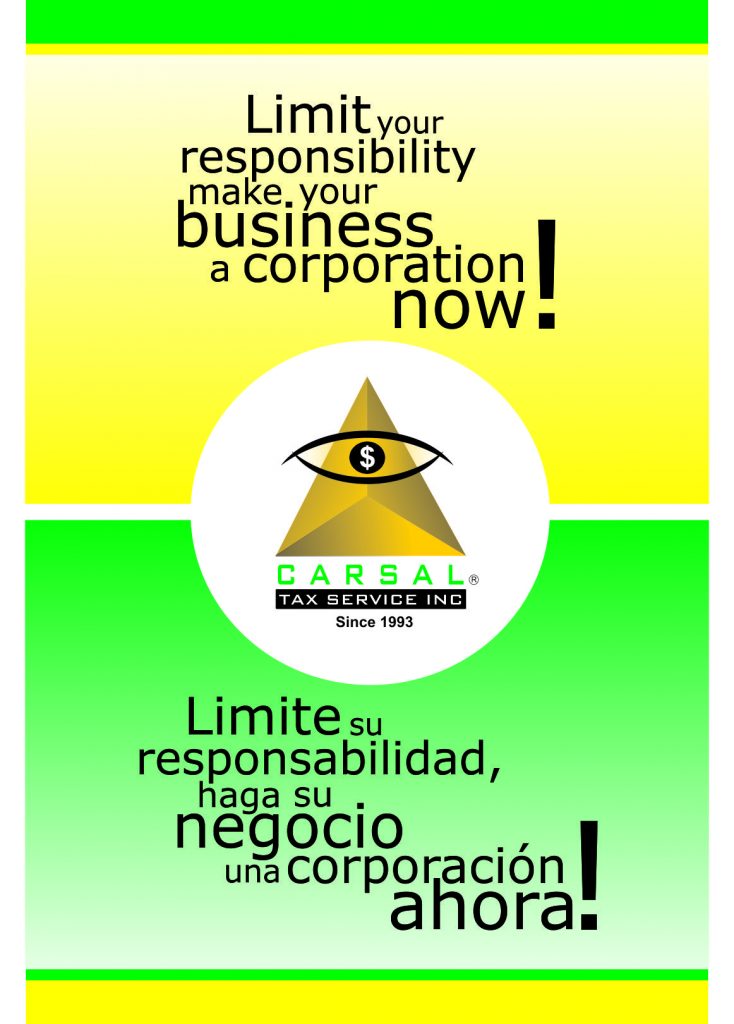If you're not incorporated, you don't look as professional as you feel. Protect your personal assets, get tax benefits, and grow your business by joining today.


Why should I incorporate my business?
If you’re not incorporated, you don’t look as professional as you feel. Protect your personal assets, get tax benefits, and grow your business by joining today. The corporation is considered an artificially created legal entity that exists separately and apart from those people who created it and carry out its operations. With as little as one incorporator, a corporation can be formed simply by filing a corporation application with the respective status. When submitting this request, the company will register the data, such as:
- The purpose of the desired corporation,
- The names and addresses of those incorporated
- The amount and types of capital shares that the corporation will be authorized to issue, and
- The rights and privileges of the holders of each class of shares
What does it mean to be incorporated?
Simply put, incorporate is the process of defining your business, both legally and strategically. You wouldn’t build a house without a paper plan and design. So why build a business that way? By choosing an LLC, S Corporation (S Corp.), or C Corporation (C Corp.), you have the freedom to decide on a tax structure that works for your business.
S Corp., C Corp. or LLC: which is the best for me?
Business goals are not one-size-fits-all, and neither is joining. When deciding which type of corporation fits your business strategy, consider some of the different benefits each genre offers. And do a deeper search with the comparison table linked below.
S Corporation:
- Elimination of double income tax.
- Investment opportunities.
- Tax filing once a year.
Corporation C:
- Unlimited growth potential through the sale of shares.
- There is no limit on the number of shareholders.
- Tax deductible business expenses.
Limited Liability Company (LLC)
- Simplicity
- There is no residency requirement.
- Structure flexibility.
Why incorporate?
It is true that operating as a corporation has its share of drawbacks in certain situations. For example, as a business owner, you must be responsible for additional record keeping requirements and administrative details. More importantly, in some cases, operating as a corporation can create an additional tax burden. This is the last thing a business owner needs, especially in the early stages of operation.
Remember, aside from tax reasons, the most common motivation for incurring the cost of establishing a corporation is the recognition that the shareholder is not legally responsible for the actions of the corporation. This is because the corporation has its own separate existence totally separate from those who run it. However, let’s examine three other reasons why the company proves to be an attractive vehicle for conducting business.
- Unlimited Life. Unlike owners and partnerships, the life of the corporation does not depend on the life of a particular individual or individuals. You can continue indefinitely until you achieve your goal, join another business, or go bankrupt. Unless otherwise stated, it could continue indefinitely.
- Transferability of shares. It’s always good to know that the ownership interest you have in a business can easily be sold, transferred, or gifted to another family member. The process of shedding ownership of property and partnerships can be cumbersome and costly. The property must be re-titled, new documents must be extracted, and other administrative steps must be taken every time the slightest change in ownership occurs. With corporations, all the rights and privileges of individual owners are represented by the shares they own. The key to a quick and efficient transfer of ownership of the company is on the back of each certificate, where there is usually a designated place for the shareholder to endorse and sign the shares to be sold or scrapped.
- Ability to increase investment capital. In general, it is much easier to attract new investors to a corporate entity due to the limited liability and easy transfer of shares. Shares can be transferred directly to new investors, or when large public offerings are involved, the services of brokerages and stock exchanges are used.
Advantages of Incorporating
- Owners are protected from personal liability for company debts and obligations.
- Corporations have a trusted set of legal precedents to guide owners and managers.
- Corporations are eventually the best vehicle for public companies.
- Corporations can more easily raise capital through the sale of securities.
- The corporation can easily transfer ownership through the transfer of securities.
- Corporations can have unlimited lives.
- Corporations can create tax benefits under certain circumstances, but be aware that C corporations may be subject to “double taxation” on earnings. To avoid this, many business owners choose to operate their corporations under subchapter S of the Internal Code. Also known as an S corporation, this entity allows income to be passed on to individual shareholders.
Disadvantages of Incorporating
- Corporations require annual meetings and require owners and directors to observe certain paperwork.
- Corporations are more expensive to establish than partnerships and sole proprietorships.
- Corporations are required to periodically file with state and annual fees.